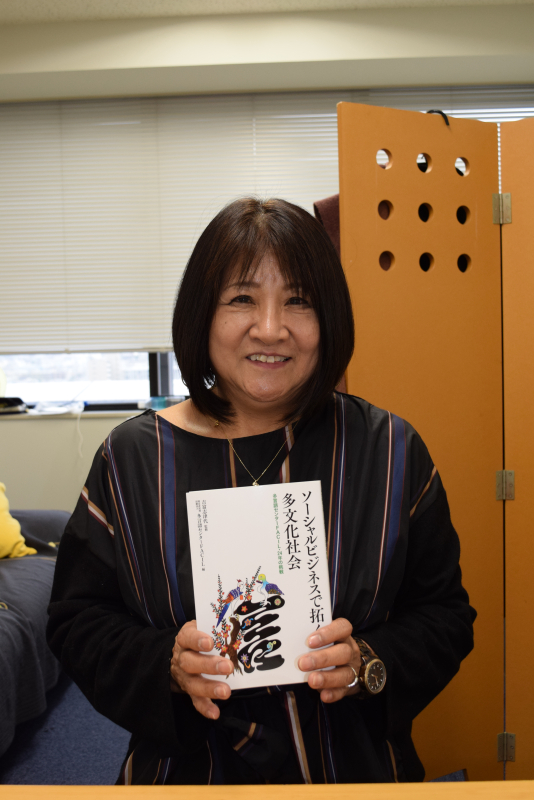吉富志津代教授が監修した「ソーシャルビジネスで拓く多文化社会 多言語センターFACIL・24年の挑戦」が出版されました。
2024/03/23
English below.
社会福祉学科の吉富志津代教授が監修した「ソーシャルビジネスで拓く多文化社会 多言語センターFACIL・24年の挑戦」が出版されました。「日本で暮らす多様な国の人たちが生きやすい社会を実現するため、活動を多くの人に知ってほしい」と語る吉富教授に聞きました。
FACILは、外国人が必要とする情報の翻訳や通訳など多様なニーズに多言語でこたえるNPO法人です。吉富教授が中心となって1999年に立ち上げました。現在、74の言語の翻訳・通訳者として1700人が登録し、ニーズに応じて活動しています。
吉富教授は大学でスペイン語を学んだ後、神戸市のボリビア領事館で勤務。そこで日本に出稼ぎに来たブラジル人やペルー人から多数の困りごとが持ち込まれました。困りごとの筆頭はやはり「ことば」。日本社会のルール、企業とのやり取りなど「コトバ」が壁になり、孤立する外国人たちが、吉富教授にすがるように相談を寄せてきました。
「行政に提出する書類一つにも言葉が壁になる。プロの翻訳者に頼む費用がない外国人は途方に暮れていました」と吉富教授。当時の日本社会では見えにくかった在留外国人の姿が顕在化したのが、阪神淡路大震災。多くの外国人が被災し、情報から取り残されました。「こんなにたくさんの外国人が地域にいたことに改めて気づかされた」と吉富教授は振り返ります。まずは命にかかわる情報を韓国語やベトナム語、スペイン語、タガログ語など、多様な言語で1人1人に届けるため、コミュニティFM「FMわいわい」を設立。そこでつながった多様な国の人たちを通訳・翻訳者として「支える側」に巻き込んで、「多文化センターFACIL」が生まれました。
ボランティアは無償という考えが根強かったころ。FACILも当初は任意団体でしたが、「割安でも対価を設定することで、息の長い活動ができる」と、2006年にNPO法人に移行。これにより多くの雇用が生まれ、「コミュニティビジネス」の先駆けとなりました。
著書では、FACIL設立から今日までの経緯を日本社会の状況やNPOの広がりと重ねてつづり、事務や翻訳・通訳者、コーディネーターなどとして運営を支えた人たちのコラムやインタビューが多数掲載されています。
「プロの通訳者なら専門領域に特化できるけれど、私たちのもとにはあらゆる分野の相談が持ち込まれる」と吉富教授。本からはそうした無理難題と格闘しながらつながりの輪を広げてきた人々の率直な声が聞こえてきます。
吉富教授は2022年にFACIL理事長を退き、現在は特別顧問。武庫川女子大学の社会福祉学科で福祉と多文化共生の両面を学生に伝えています。実は多文化共生を社会福祉学科のカリキュラムに組み込んだ大学は武庫川女子大学が初めて。吉富教授は「言葉や文化、習慣が違うために必要なサービスを受けられない人を支えるにはまず、同じ地域住民であるという意識を持ち、人権や社会福祉の視点でアプローチすることが必要です。ソーシャルワークの対象に日本人も外国人もありません。福祉を学ぶ学生に身近なところから多文化を知り、考える機会を提供していきたい」と話しています。
Professor Shizuyo Yoshitomi of the School of Psychology and Social Welfare supervised the publication of 'Multicultural Society Developed through Social Business: The 24-year challenge of the Multilingual Center FACIL'. Professor Yoshitomi says that she wants more people to know about the activities of FACIL in order to build a society in which people from diverse countries living in Japan can live comfortably.
FACIL is a non-profit organization that provides multilingual support for the diverse needs of foreigners, including translation and interpretation of information required by foreigners. It was set up in 1999 under the leadership of Professor Yoshitomi. Currently, 1,700 people are registered as translators and interpreters in 74 languages and work according to their needs.
After studying Spanish at university, Professor Yoshitomi worked at the Bolivian Consulate in Kobe. There, she received many requests for help from Brazilians and Peruvians who had come to Japan to work as migrant workers. The first of the most common problems is language. Foreigners isolated by language barriers, such as the rules of Japanese society and dealing with companies, came to Professor Yoshitomi for advice.
“The language is a barrier even when submitting documents to the government. Foreigners who could not afford professional translators were at a loss," says Professor Yoshitomi. The Great Hanshin-Awaji Earthquake brought to light a figure of foreigners living in Japan that was difficult to see in Japanese society at the time. Many foreigners were affected by the disaster and were left out of the information. Professor Yoshitomi recalls, "I was made aware once again that there were so many foreigners in the region. The first step was to establish a community FM station, FM Wai Wai, to deliver life-threatening information to each and every person in a variety of languages, including Korean, Vietnamese, Spanish and Tagalog. The Multicultural Centre FACIL was born by involving people from diverse countries connected there as interpreters/translators and 'supporters'.
The book describes the history of FACIL from its establishment to the present day, overlaying it with the situation of Japanese society and the expansion of NPOs, and includes numerous columns and interviews with people who have supported its operations as administrators, translators, interpreters, coordinators and others.


